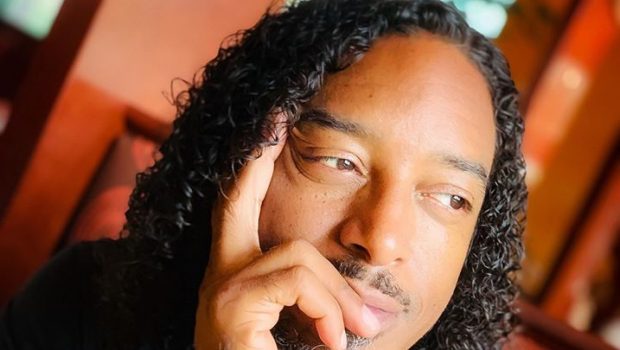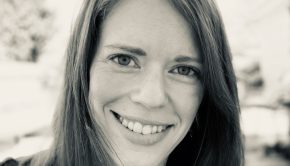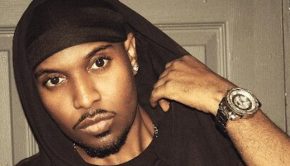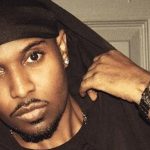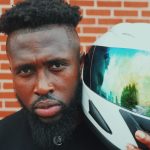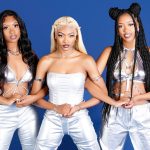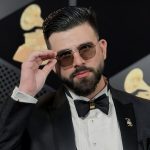Pt. 2: Dr. Garfield Bright Explains How Shai’s “Practice Song” Put the Group on the Map!
“If I Ever Fall In Love,” was a song Shai used to warm up their vocal cords. Little did they know, they had created a hit single!
It’s highly risky to enter the airwaves as a quartet and your debut single be acapella. Just old-fashioned harmonizing. That’s exactly what four brothers from Howard University were able to pull off. Shai’s debut single, “If I Ever Fall In Love,” reached #2 on the Billboard Hot 100. Very impressive for a song with no production. Just four guys using their God-given gifts. A very rare gesture at that time and they nailed it. Dr. Garfield Bright, one of the original and remaining members of the group recalls performing the song at a talent show at Howard and being one of the only acts that didn’t get booed.
During the final installment of my interview with Dr. Garfield Bright, we cover everything from him turning vegan as a teenager, his love for boxing as well as the success of the group, !
Veganism is something you have followed since you were a teenager. I covered boxing for a number of years, and there was a time where boxers experimented with veganism. That’s important to you.
Dr. Garfield Bright: Let me tell you something, bruh, that is by far my favorite sport. Since I was 5 and 6 with my pops, we would sit around and all we would do is watch boxing. I’m talking about… I might be a boxing historian from that. I know a lot about boxing. Fighters that people forgot about, styles, fights. Seriously bruh. I’m all about boxing.
We just linked on a level beyond this interview and ironically, I watched my first fight at 6-years old. April 1987, I watched Leonard-Hagler with my pops as well.
Dr. Garfield Bright: Hey… 1976, Sugar Ray Leonard, the Olympics, Montreal, Gold Medal. He beat Andres Aldama the Cuban. That’s where I’m at with it. I’m telling you, bruh. It’s real over here with the boxing. I love boxing. I’m waiting for Errol Spence and Terence Crawford to finally get in there. I can’t root for nobody because I love both of them dudes.
We can talk boxing for days, but I wanted to let you talk about being a vegan. You’re damn near 50-years old or you may even be 50 now and you look great, man.
Dr. Garfield Bright: Yeah, I’m 50. I’ll be 51 in October. I don’t feel it. I was born in 1969 like a mug (laughing). I’ve been like this for a while. This is crazy, so I’m from Massachusetts. I lived in Brockton, Massachusetts all through high school. One day in the summertime. It’s going to sound like a book. Like, “Stand By Me,” or something. One day in the summertime, down the block from my crib. I was at the gas station. Me and my two homies. Three brothers stepping out of the car and who do we see across the way, three females getting out of their car getting ready to pump some gas. It’s summertime, high school, so I holla a lil bit. And come to find out, one of them is Dick Gregory’s daughter, Ayanna. We hit it off. It was actually one of her girls I was trying to holla at, but Ayanna hit it off on some real stuff. Come to find out, my birthday is October 12th and Dick Gregory’s birthday is October 12th. Because of that, she always held me in a special place. She actually took me to her crib that day. Never brought anybody to her crib. It’s Dick Gregory’s house. He’s private. Nobody supposed to be coming up in there. But she trusted us. We came into the crib and this was in like 1986. Way before, Trader Joe’s was thought about. In Dick Gregory’s house, she showed me all these different types of food that didn’t have sugar as a sweetener, beet juice and packets of cellophane. I was like, “There is no way you’re going to tell me that donut is good and it ain’t sweetened by no sugar.” She was like, “Taste it!” And I was like, “Oh my God!” So, Ayanna kind of started me on that path at 16-17-years old. She was like, “You need to stop eating that Burger King. You skin is going to be messed up.” I was like, “For real?” She was like, “Yo, you don’t need that in your life, this is what it’s going to do to you.” I took her serious.
I went to Howard that next year. A year and a half into Howard I joined the Nation of Islam. In the Nation, we were only eating one meal a day, no beef and no pork. I ate fish at the time, but I was already on my good food diet. We were reading how to eat to live and staying away from all the wrong foods. I did the one-meal a day. I was in the Nation for like 2 ½ to 3-years before I had to fall back and finish what I started. And then, Shai happened and all that. But I retained all of my eating habits for sure-for sure. From 17, all the way until I went vegan. I would fast… for the mosque we would fast. We would do this thing called unity fast every first of the month. Thursday’s meal was the last meal you ate until we came to mosque meeting on Sunday and that’s when we would break fast. The first week of every month we would do that. So, 3-days without nothing but water. You could drink water, but we wouldn’t eat no food. Not even at nighttime for 3-days. You get that blood purified. And then start back where we would eat between 4 and 6:00 and that would be your meal. Your blood would be clean, and you would be full. Your body wouldn’t even want extra food. You would regulate your water intake just like a cat regulates their water intake. Your body kind of did that.
So, even back then I was on it and I was still athletic. I played AAU basketball. My high school was ranked 22nd in the nation my senior year. I was a shooting guard. I actually had a few D-1 offers to some schools, but I wanted to go to Howard so bad, and they weren’t offering me anything (laughing). I was an athlete and I was able to maintain and still play ball, and do what I was doing, but I just wasn’t eating meat no more. It was way ahead of time. Nobody understood me. Family functions, they were trying to make me things with meat in it without telling me. But as I got older and people would see me and be like, “Man, you look good for your age. Maybe the way you were eating all of that time is doing it for you.”
So, maybe I am way overthinking this, but you guys had to really believe in your voices to make, “If I Ever Fall In Love,” an acapella your lead single and opening single. How did that become the song to break, Shai?
Dr. Garfield Bright: Man, that song was legitimately our practice song. You get a couple of songs that you create so that when the group wanna warm up together… like if you play an instrument in a marching band. They got these little things they call fanfares. It’s really just for you to get your chops right, get your blend right. It’s not a real song in your mind. It’s a song enough for ya’ll to come together and play ya’ll part and get ya’ll shit sharp. And then we play other songs where you can hold your breath better and shit like that. That’s what, “If I Ever Fall In Love,” was for us. The only reason why it caught traction like that, that show we did at Howard University before we got signed. The only show we ever did before we got signed in Cramton Auditorium. We were the only group that didn’t get booed. They gave us an encore, and when we came back on stage, we didn’t have another song to sing because when we came out that night, we were covering songs from Boyz II Men. Like a medley. And we won with that shit.
Ya’ll just didn’t expect to have to go back up there.
Dr. Garfield Bright: Not at all. When they gave us the encore, we had the track all cued up with Boyz II Men songs. Back then it was a Dap Player. We didn’t have no more tracks to play and we didn’t know what to do, so we were like, “Hey, ya’ll wanna do, “If I Ever,” our practice song?” We didn’t need no track for it. We could sing it right to the crowd. All we needed was to snap our fingers to keep the beat, so we just did that, and by the second chorus, the whole auditorium was singing the hook. They already knew it. So, not only did we not get booed that night, but we got an encore, a standing ovation and then the whole crowd… these hardcore New York dudes and football players gave us love-love-love. And from that energy, right there on stage, we were still on stage, we said, “Ya’ll wanna try and get a record deal?” So, from that night, “If I Ever…” because a key song to us. It was like, “We got that kind of response?”
Was this a weekly show, monthly, quarterly?
Dr. Garfield Bright: The history of that show, it’s a spring show that happens at Howard at Cramton Auditorium. All of the talent at Howard come there and show off their talent; it’s a talent show. But when the New York heads hear talent show, they immediately think, The Apollo. And the football players, they just rally. That’s who populates this event. It’s mostly New Yorkers and football players. So, every artist that comes on, no matter how nice you are, they get booed. We lucked up and went last. We got lucky with the draw. But case and point, this dude named Eric Roberson that came out of Howard became a talent. He wrote and sang songs with Jill Scott and everybody. He had his own stuff. He sung, “Pretty Brown Eyes,” which has just come out by, Mint Condition. He killed it, but they booed him. Not because of his talent at all. He was ridiculous, but their entertainment was to boo the talent and our entertainment was to try to sing.
The next talent up was Shawn Allen. She is Debbie Allen’s niece. Back then she was in a group that came out of Howard called, “Pure Soul.” They were also signed in the industry. And she came out singing some ill-joint. She was highly skilled. She was singing the National Anthem for the marching band. She got booed just because they like booing. And then my homie Tracy Lee, he got signed to MCA too. He was a hip-hop artist. And at the time he had this joint out, “And everywhere that my crew go.” That was him. But back then before he was signed, he was just, Tracy Lee, and he had made up this dope ass rhyme about dorm life called, “Creepin!” And the hook was like, “You creepin’ you creepin’ every single weekend, you creepin’-you creepin’!” He had this whole elaborate rhyme about people creepin, it was dope. And they booed him. Trae Lee is a nice emcee. He didn’t climb the ranks in the commercial field, but all the artists that can rhyme remembers Tracy Lee as a dope emcee.
I’m sure it was a gift and a curse going last at this point. You had the opportunity to see the field of talent, but I’m sure doubt was creeping in by then.
Dr. Garfield Bright: We just knew we were going to get booed. We came out and the first song of the medley we did was, “10,9,8,7,6,5,4,3,2,1… Injection fellows.” I said that (laughing). The girls went crazy, we were in there, the dudes didn’t boo. Then we went right into, “Please Don’t Go,” and then another couple of songs and then we closed it with, “End of the Road.” And then at the end we did the acapella for the breakdown. I had the base. We were killing it. The victory was, it was all good, we didn’t get booed, we got off the stage, they closed the curtains, it was a victory. And like I said, then we had the encore, we came out and sung, “If I Ever,” and the crowd fell in love with it. a rowdy ass crowd fell in love with it and didn’t boo us. And gave us even more love by singing the damn song that they never even heard of. That’s how, “If I Ever,” acapella was the first song off the bat.
The record label, once they kind of got traction with the radio station in DC that played it, MCA started getting interested because that station was P1. Back in those days before the big consultant firms, it was really driven by fans calling in and stuff. Those big stations would create a program, a playlist and other little stations would copy their playlist in the other markets., P2 and P3 markets. The P1 market… even though we had no idea about none of this shit back in the day, we just had our song on the radio is all we knew. But that radio station was a P1 that had like 4 or 5 other sister stations across the country. Those sister stations automatically added it to their playlist, and then the stations that copied the larger stations playlist also added the song. So, before we were signed, we were getting chart position. So, MCA were like, “Oh okay, this group right here is already charting. If we sign them, we can easily take them over the top.”
But they were like, “But it’s acapella. We don’t know if that’s going to work between two songs with tracks on mainstream radio.” Boyz II Men had just came out with, “Cooleyhighharmony.” Only thing was, “If I Ever,” was something original that we wrote, and nobody ever heard of. And “Cooleyhighharmony” was from the movie Cooley High and DC Cameron and everybody had heard that song. That was a classic song. Even though it was acapella with Boyz II Men, it had recognition to it. People knew it, so that could be done. But for us, ain’t nobody know, “If I Ever,” these 4-college kids. So, the label was like, “We’re going to give ya’ll a demo deal with enough money to record a music version this time. And based on how we feel about this music version, we’ll know if we’re going to keep it as a demo deal and see how it does, or if we’re really going to do something.” We created that music version with the small amount of money they gave us just to make that song. After about 2-weeks they came back and offered us a full album deal based on the fact that they thought that song was dope. The remix was dope, the music version was dope, so they felt like they could service the market place with one or the other in case somebody was like, “Nah, we don’t do acapella,” they can give them the music version. And we did it to where it wasn’t too urban in their minds and it wasn’t too pop in our minds. We didn’t try to make it like that, that’s just the chords and melody… that’s what we ended up doing. Darnell my homie in the group, he found this… rest in peace, Isaac Hayes sample. To one of Isaac Hayes songs. That was some Isaac Hayes shit, we took that and that was the magic. And the heavy drums. It was slightly different from the acapella, but we got in there and figured it out and it worked. We got our boy, Kevin Levi from Howard’s jazz band to come and play the sax on it. We had all the stuff at our disposal, the label loved it, the next thing we knew, we were overseas in Europe touring while the song was blowing up in the United States. We had no idea how hot we were in the US yet. We had no idea what was going on.
Do you remember the first time you heard the group on the radio and what was that like for you?
Dr. Garfield Bright: It was crazy. We heard ourselves on the radio, coming out of the studio from listening to a mix of the music version, we heard the acapella version on the radio. It was like 2 in the morning, coming out the studio, got in the car and turned the radio on, college kids. Sleepy as I don’t know what trying to get the other version done and send it back to the label, and I’ll be damned if, “If I Ever Fall In Love,” didn’t come on the radio. The song was acapella, so whatever was going on before it, it was like a spiritual connection because there was no music. It was just singing. It was a different vibe in that space where there were no other tracks before it or after it. So, “If I Ever,” when it would come on would have a different resonance about it that captured your attention and made you just shut up and listen. It was like somebody just singing to you because there was no track. You can tell it wasn’t overly produced. It was just us singing like that. It felt authentic, so that thing just created a storm of its own, man. It was crazy.
In your opinion, is Shai “Unsung?”
Dr. Garfield Bright: We ended before we can get a body of work to showcase our talents. We only got to put out a couple of albums with the original members. But within that small little sample size, people could tell that there was something special about us, and that we had our own thing. We wrote and produced our own music. We had a sound that was like nobody else’s. We weren’t biting nobody. Even though we did harmony, we didn’t sound like Boyz II Men and they didn’t sound like us. We didn’t sound like Jodeci, we didn’t sound like Silk, nor didn’t they sound like each other. That was a time period in music that was so dope because everybody really had their own style. We had old heads that we looked up to, but we interpreted it so different and it was all good. That was a hell of a golden era. That’s what it was for us.
I showed my son the, “Baby I’m Yours” video and I told him, that’s how we used to have to holla at girls. We didn’t have SnapChat and Twitter and all this other stuff. That video is so 90’s in every sense of the word.
Dr. Garfield Bright: Hey let me tell you about what you just said, it was so real what you just said because that video, we were like, “Look man, we going back to Howard University to do a video.” We demanded that from the label because they were pushing us to all these white radio stations and alienating us from our black base. But the black radio stations, instead of being mad at the label, they were actually mad at the four black dudes in Shai. They thought we really had control over this thing. We were coming into the industry just doing what they say do. They were the pros and we were the artists. We didn’t take responsibility that quick. But the people at the radio stations were like, “Nah, ya’ll not coming to the black stations when ya’ll coming to town. And once we started realizing they were feeling like that, and it was affecting our airplay, we were like, “We gotta do something about this. We came out of Howard. If anybody black, we black. We got a whole black tradition about us. We went to the Mecca.” So, we made them do the video at Howard.
I was usually over the casting of the girls in the video. I was the one going through the hundreds and hundreds of cards that the models and agencies would submit to us and we would choose certain girls from or whatever. I started feeling like, “Nah man, we going to Howard, that’s some of the most beautiful women in America. I’m not going to disrespect them by picking some models and basically importing sand to the beach. When we get to Howard, we are going to go scout and pick girls from the video that day.” And that’s what we did. But we knew everybody at Howard. We got Ananda [Lewis]. Carl was with her. This girl named, Joy… she ended up being a major record exec at Capital Records. That’s the girl that was with Darnell. The girl I was with named, Kenya. She was a dope young lady out of Howard. She was basically somebody I had a crush on the whole time. We had a video poppin, I figured that was my chance to go ahead and… what better time. I got a little leverage (laughing). The other dude, Mark, he married the girl from the video. They met up like 30-years later and fell in love 30-years later. They have a baby now. It’s crazy. You can’t even write a script with that in it. That’s how it went down, man. We picked the girls when we got to the school and locked it in. We did a video at our stomping grounds of where we had just come from.
Was it just difficult to keep a quartet together just because it is essentially sharing the microphone with three other people?
Dr. Garfield Bright: It’s like any team dynamic. Whether it be the corporate world or sports, a group or a family; siblings, brothers and sisters. People grow asymmetry. They start in a place where the compatibility overlaps in a lot of ways to where ya’ll got sticking power, but as people grow and have different understandings of who they think they are. Their identity starts to develop in a way that starts creating asymmetry or they are going out of the box where we are all set. And then it starts looking different and people start looking different to us. Depending on how mature you are at the time in terms of absorbing that and processing it and making sense of it, dictates whether or not we will be able to hang in there. A lot of times…you know, young 20-year olds aren’t totally stable identity wise yet. Some people come in more, in their own bag and they know who they are quicker than others. But by and large when you’re 20, you still have another 5 to 6-years to grow before you really lock into who you are as a man. Maybe a little later for some people. But at the time, you’re in a whirlwind industry at the same time, there is an identity for your personal self and then there is a group identity that you’re trying to navigate in terms of what we’re going to be. And then there’s the music. Just all these dynamics that occur that are variables to where, if any of them goes wrong, it can really knock the wheels off.
And that’s kind of what happens in a lot of those scenarios I just named. And it happened to us. It’s the way growth looks, man. Even if you look at those Jordan, Bulls teams. It’s like skin to a reptile peeling off, and then Pippen comes in. And then they replace your boy Paxson with Kerr. Same dude in a different body. It’s growth. You got a new dynamic, but the other ones fell off for whatever reason. Those booster rockets were no longer compatible with the ship. It was basically that, but at the time if you would’ve asked me, we wouldn’t have had no way to answer that. But in hindsight you can look at it as a byproduct of growth and asymmetry in recognizing different people’s growth that are growing with you. But me and Darnell, we stuck it out. That’s my homie. We met at 17. That was my roommate my freshman year at 17-years old. We are the two original members. We’re still out there doing shows. We were the most alike out of everybody in terms of how we grew up and stuff like that.
Tweet
